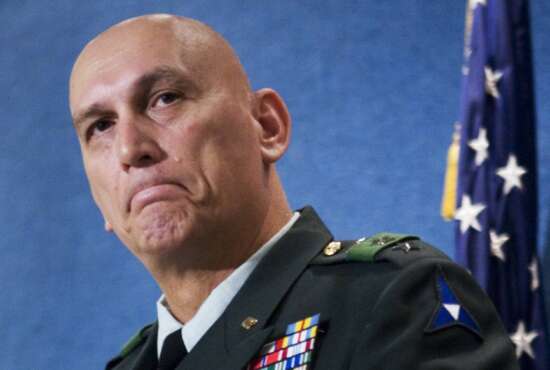General Ray Odierno: An appreciation
Tough and affable at the same time, and sometimes controversial, Ray Ordierno was a soldier's soldier.
As an attendee of up to 25 Washington Nationals baseball games each year, I often don’t watch the ceremonial first pitch. I dislike seeing people embarrassed. Even one-time jocks like Anthony Fauci can screw it up. But when Ray Odierno threw that first pitch, back in June of 2014, I watched. His collegiate pitching career showed.
Over the years, certain guests stand out in my mind, people I liked interviewing. Among them is General Odierno, the retired Army chief of staff who died over the weekend at 67. I interviewed him several times, including in person at two of the Association of the U.S. Army shows. His untimely loss must hang over this year’s AUSA event, going on this week.
You couldn’t miss Odierno. A large man with a shiny bullet head, he looked like an Army general. Energetic and exuberant, he seemed to relish the interviews, and gave them — and me — his full attention for the 10 or 12 minutes they took. His personality was something you didn’t forget. Even my wife remembered him, having met him briefly at, if I recall, a USO dinner.
As commander of forces in Iraq, including during the surge, Odierno had a tough job. In the post-World War II era, on several occasions U.S. forces have had to suppress enemies within a nation while trying to enlist the support of everyone else in that nation. It’s an extraordinarily difficult thing to do.
One time, when I was editor of a large, bi-weekly publication in the federal market (back when we put ink on paper), I invited a retired Army brigadier general to speak at an editorial retreat. He’d joined a technology company with many federal customers. He remarked with a chuckle, “I spent my career learning to break up things and kill people. Now I’ve got to delight the customer!”
In many ways that sums up Odierno. A warrior known for his tough tactics and emphasis on lethality, he was also downright affable, even jolly, in personal relations. By all reports, he was a favorite of his troops.
For his first tour of Iraq, Odierno is dinged for having been too aggressive — breaking up things and killing people. Later in Iraq, Odierno had the task of leading a surge, which required an increase in violence, to put down an insurgency from al-Qaeda. Yet the Army also had to operate within guidelines designed to gain support from regular Iraqis. The whole enterprise will be debated until the history books, but Odierno gets credit for taming al-Qaeda and returning some degree of stability to the country. He also was in charge when Saddam Hussein was discovered in a cellar — Odierno said “like a rat” — and brought to trial.
Odierno also wasn’t cowed by Congress. He argued forcefully before armed services committees for the Army budget, using blessedly plain language. In what Task and Purposed called a smackdown, Odierno forcefully argued with then-Representative Duncan Hunter (R-Calif.) during a House Armed Services Committee meeting over Army Intelligence. Hunter went on and on, then left his chair. Odierno and then-Army Secretary John McHugh in effect made him sit down again so they could answer. Said the general, “I object to this. I’m tired of somebody telling me I don’t care about our soldiers, that we don’t respond.”
No one can serve at high level in a controversial war and not become controversial. But you can’t say Odierno didn’t care about the troops.
Copyright © 2024 Federal News Network. All rights reserved. This website is not intended for users located within the European Economic Area.
Tom Temin is host of the Federal Drive and has been providing insight on federal technology and management issues for more than 30 years.
Follow @tteminWFED





